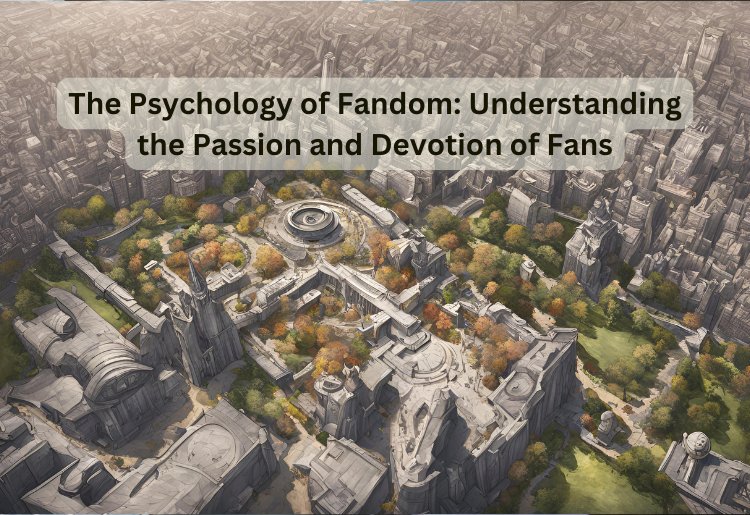The Psychology of Fandom: Understanding the Passion and Devotion of Fans

Fandom is a unique and powerful phenomenon that can transform the way individuals experience entertainment, sports, or even certain social causes. From Star Wars to Harry Potter, from sports teams to reality TV shows, people form deep emotional connections with the things they love. But what is it about these fandoms that inspire such passion, devotion, and even identity? Why do fans form communities, dedicate their time and money, and sometimes even develop life-long relationships with the objects of their fandom?
The psychology of fandom is complex, shaped by a variety of cognitive, emotional, and social factors. Fans aren’t just casual consumers of entertainment; they often develop intense emotional ties to the media, characters, or celebrities they adore. In this article, we’ll explore the underlying psychological motivations for fandoms, the benefits fans experience, and the possible pitfalls of this deep connection.
The Emotional Power of Fandom
At the core of any fandom is an emotional connection. For fans, their chosen franchise or community represents much more than mere entertainment; it’s a source of joy, comfort, and emotional fulfillment. This deep emotional connection can stem from several psychological needs that fandoms satisfy.
-
Escapism and Identity Formation Many fans turn to their fandoms for a sense of escape from the stressors and challenges of daily life. Whether it’s through the thrilling action of a superhero movie or the immersive world-building of a fantasy novel, fandoms offer a safe and imaginative space for fans to temporarily forget their troubles. This form of escapism can be a coping mechanism, providing solace in times of emotional distress or difficult life circumstances.
Moreover, fandoms often offer a platform for fans to explore their own identities. Characters in fandoms represent diverse qualities and values, and fans may identify with these characters in personal and meaningful ways. For example, fans of Harry Potter may see themselves in the brave yet vulnerable protagonist, while fans of Star Trek may find a sense of belonging in the inclusive, future-oriented vision of the show.
-
The Need for Belonging and Community Fandoms foster a sense of community and belonging that many people deeply crave. In a world where social isolation can be prevalent, fans often find solace in shared interests and the bonds they form with like-minded individuals. Fandom communities—whether online forums, fan conventions, or fan clubs—serve as social support networks where individuals can connect with others who understand their passions.
These communities also create a sense of shared identity. Being a "Trekkie," a "Potterhead," or a "Whovian" isn’t just about liking a show or a book; it becomes part of who fans are. For many, this shared identity offers a sense of purpose and validation, reinforcing the idea that their interests are meaningful and worthy of celebration.
-
Sense of Achievement and Mastery In fandoms, many fans engage in creative expression, whether it’s writing fan fiction, drawing fan art, or crafting elaborate cosplay. This creative engagement can serve as a form of self-expression, helping fans build confidence and develop new skills. In doing so, fans may also experience a sense of achievement and mastery, as they grow in their craft and share their work with the community.
Fans who actively participate in fandoms by contributing content or attending events often experience a deep sense of accomplishment. The process of engaging with a beloved franchise on a creative level can deepen their emotional connection to the material and enhance their overall sense of identity.
The Psychological Benefits of Fandom
While the emotional and social dimensions of fandom are important, it’s also worth exploring the psychological benefits that fans gain from their involvement.
-
Positive Emotional Experiences Fandoms can be an immense source of positive emotional experiences. When fans engage with their favorite franchises, they experience feelings of joy, excitement, and nostalgia. The thrill of discovering new content, such as a new season of a show or the release of a highly anticipated movie, brings fans an intense sense of pleasure. Fans often look forward to these experiences as highlights in their lives, using them to enrich their emotional well-being.
Additionally, fandoms offer a shared source of joy during milestones or celebrations, such as movie premieres or a sports team’s victory. The shared euphoria within these moments can create lasting, positive memories and connections.
-
Social and Cognitive Benefits Participating in a fandom can stimulate social interaction, helping individuals build friendships and social networks. Fans bond over their shared interests, collaborating on creative projects or discussing theories about their favorite stories. These interactions foster cognitive benefits, as fans are encouraged to think critically about the material they consume. The complexities of storylines, character motivations, and thematic elements can provoke deep analysis and thoughtful conversation.
In online fandom spaces, fans from all over the world can collaborate, share ideas, and learn from one another, often building valuable cognitive and social skills. For many fans, these communities provide intellectual stimulation and exposure to diverse perspectives, enriching their worldview.
-
A Sense of Control In a world that often feels unpredictable and out of control, fandoms offer fans a sense of agency and control. Fans can engage in storytelling, create fan theories, and even influence the direction of their favorite media through fan-driven content. In a way, fandoms allow individuals to reclaim some level of control in their own lives, empowering them to shape their interactions with the stories and characters they love.
The Dark Side of Fandom: Obsession and Toxicity
While fandoms offer many positive psychological benefits, they can also present challenges when devotion becomes excessive or unhealthy. The psychology of fandom isn't without its pitfalls, and some fans may struggle with issues such as obsession, toxic behavior, or unhealthy attachment to a franchise.
-
Obsessive Behavior In some cases, fandoms can veer into obsession. When fans become fixated on a particular show, character, or celebrity, it can interfere with their day-to-day lives. Obsessive fandom can lead to neglect of other responsibilities, such as work, relationships, or personal well-being. This may be driven by an intense desire for validation, a fear of missing out, or a lack of balance in the fan’s life.
-
Toxicity and Gatekeeping Unfortunately, not all fandoms are welcoming and inclusive. Some fan communities can develop toxic behaviors, such as gatekeeping, bullying, or exclusionary practices. Fans may dismiss newcomers or argue over the "correct" interpretation of the media. These toxic behaviors can lead to emotional distress, and in extreme cases, fans may be alienated or ostracized from the very communities they once felt part of.
-
Escapism Gone Too Far Fandoms can become a form of escapism that goes too far, especially when fans use their fandom as a way to completely detach from reality. If fandom becomes a means of avoiding real-life problems—such as relationship issues, mental health struggles, or personal growth—then it can perpetuate unhealthy patterns of avoidance. In some cases, fans may withdraw from real-life social interactions and responsibilities to live entirely within the fantasy world of their fandom.
Conclusion: The Power of Fandom and the Human Need for Connection
Fandoms are powerful because they tap into some of our most fundamental psychological needs: the desire for belonging, self-expression, and emotional fulfillment. While they offer immense rewards in terms of connection, creativity, and emotional well-being, it's essential to recognize the potential pitfalls of obsession or unhealthy attachment. At its best, fandom provides a space for people to feel understood, celebrate their passions, and build communities that transcend physical boundaries.
For fans, fandom is more than just a hobby; it’s a way of engaging with the world that brings meaning, connection, and joy. Understanding the psychology behind fandom helps us appreciate the complexity of this devotion and the ways in which it shapes our identity and relationships. As we continue to navigate the ever-expanding world of fandom, one thing is clear: the power of passion, creativity, and shared experience can connect people in ways that transcend the boundaries of fiction, creating real-world bonds that endure for a lifetime.





























